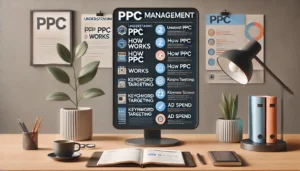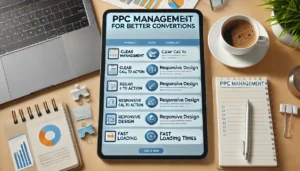The Ultimate PPC Management Checklist: Elevate Your UK Company’s Digital Advertising

Managing Pay-Per-Click (PPC) campaigns effectively is essential for any UK business looking to thrive in the digital advertising space. This article provides a comprehensive PPC Management Checklist to help you enhance your campaigns, ensuring they are efficient and yield positive results. Whether you are new to PPC or seeking to refine your approach, this checklist will guide you through the key elements necessary for success.
Key Takeaways
- Understand the fundamentals of PPC to create effective campaigns.
- Set clear goals to measure the success of your advertising efforts.
- Conduct thorough keyword research to target the right audience.
- Craft engaging ad copy that attracts potential customers.
- Regularly review and optimise your campaigns for ongoing improvement.
The Ultimate PPC Management Checklist: Understanding the Basics of PPC Management
What is PPC and How Does it Work?
Pay-Per-Click (PPC) advertising is a model where advertisers pay a fee each time their ad is clicked. It’s a way to buy visits to your site, rather than attempting to “earn” those visits organically. In essence, PPC is a powerful tool for driving traffic. By targeting specific keywords, we can reach potential customers actively searching for our products or services. This method allows us to gain visibility quickly and effectively.
Key Components of a PPC Campaign (The Ultimate PPC Management Checklist)
A successful PPC campaign consists of several key components:
- Keyword Research: Identifying the right keywords is crucial. We need to understand what our audience is searching for.
- Ad Copy: Crafting compelling ad copy that resonates with our target audience is essential for attracting clicks.
- Landing Pages: The landing page must align with the ad to ensure a seamless user experience.
Benefits of Effective PPC Management
Effective PPC management can lead to numerous benefits, including:
- Increased Visibility: Our ads can appear at the top of search results, making it easier for customers to find us.
- Targeted Traffic: We can reach specific demographics, ensuring our ads are seen by the right people.
- Measurable Results: With PPC, we can track performance metrics, allowing us to adjust strategies for better outcomes.
Regularly reviewing our PPC campaigns is vital. It helps us stay aligned with our goals and adapt to changes in the market.
In conclusion, understanding the basics of PPC management is the first step towards leveraging its full potential. As a PPC eCommerce agency, we can help businesses optimise their advertising efforts and achieve their objectives. Remember, setting goals with teams is crucial for success in PPC management.
The Ultimate PPC Management Checklist: Setting Clear Objectives for Your PPC Campaign
Defining Your PPC Goals
To kick off our PPC journey, we must first define our goals. What do we want to achieve? Is it to increase website traffic, generate leads, boost sales, or perhaps raise brand awareness? Each goal will shape our campaign’s direction and strategy.
Aligning PPC Objectives with Business Goals (The Ultimate PPC Management Checklist)
Next, we need to ensure that our PPC objectives align with our overall business goals. This alignment is crucial for maximising our efforts. For instance, if our business aims to expand into new markets, our PPC campaigns should target those specific demographics.
Measuring Success in PPC Campaigns
Finally, we must establish how we will measure success. Key performance indicators (KPIs) such as click-through rates (CTR), conversion rates, and return on investment (ROI) will help us gauge our campaign’s effectiveness.
| KPI | Definition | Target Value |
|---|---|---|
| Click-Through Rate | Percentage of clicks on ads vs. impressions | 2% |
| Conversion Rate | Percentage of visitors completing desired actions | 5% |
| Return on Investment | Revenue generated vs. ad spend | 300% |
Setting clear objectives is the foundation of a successful PPC campaign. Without them, we risk losing focus and direction.
By following these steps, we can create a robust framework for our PPC campaigns, ensuring they are not only effective but also aligned with our broader business strategies. Let’s embark on this journey together!
The Ultimate PPC Management Checklist: Conducting Comprehensive Keyword Research
Importance of Keyword Research in PPC
Keyword research is a crucial step in our PPC journey. It helps us understand what potential customers are searching for. By identifying the right keywords, we can ensure our ads reach the right audience. Effective keyword research can significantly improve our campaign performance.
Tools for Effective Keyword Research (The Ultimate PPC Management Checklist)
To conduct thorough keyword research, we can use various tools. Here are some popular options:
- Google Keyword Planner: A free tool that helps us find keywords and see their search volume.
- SEMRush: This tool allows us to track and manage both organic and paid keywords effectively.
- WordStream: It simplifies the management of PPC campaigns and offers insights into keyword performance.
Long-Tail vs Short-Tail Keywords
When selecting keywords, we should consider both long-tail and short-tail keywords. Long-tail keywords are more specific and often have lower competition, making them easier to rank for. Short-tail keywords, while more general, can drive higher traffic. Here’s a quick comparison:
| Keyword Type | Characteristics | Benefits |
|---|---|---|
| Long-Tail | 3+ words, specific | Lower competition, higher conversion rates |
| Short-Tail | 1-2 words, broad | Higher search volume, brand visibility |
In summary, conducting comprehensive keyword research is essential for our PPC success. By using the right tools and understanding the difference between long-tail and short-tail keywords, we can create more effective campaigns that resonate with our target audience. Remember, the right keywords can make all the difference in achieving our advertising goals!
The Ultimate PPC Management Checklist: Crafting Compelling Ad Copy
Elements of a Successful Ad Copy
Creating effective ad copy is crucial for the success of our PPC campaigns. Here are some key elements we should focus on:
- Clear and Concise Messaging: Our message should be straightforward and easy to understand.
- Strong Call to Action: Encourage users to take action, whether it’s clicking a link or making a purchase.
- Relevant Keywords: Incorporate keywords that resonate with our target audience.
A/B Testing Your Ad Copy (The Ultimate PPC Management Checklist)
A/B testing is an essential practise in PPC management. By testing different versions of our ad copy, we can determine which performs better. Here’s how we can approach it:
- Create two versions of the ad with slight variations.
- Monitor the performance of each ad over a set period.
- Analyse the results to see which ad copy leads to higher conversion rates.
Common Mistakes to Avoid in Ad Copy
To ensure our ad copy is effective, we must avoid common pitfalls:
- Overly Complicated Language: Keep it simple and relatable.
- Ignoring Mobile Users: Ensure our ads are optimised for mobile devices.
- Lack of Testing: Always test different versions to find what works best.
Crafting compelling ad copy is not just about creativity; it’s about understanding our audience and delivering a message that resonates with them. By focusing on clarity and relevance, we can significantly improve our PPC performance.
In summary, by focusing on these elements, we can create ad copy that not only attracts attention but also drives conversions. Let’s remember that our goal is to connect with our audience effectively, ensuring our message is clear and compelling. This page highlights Amazon Advertising solutions that can assist us in achieving our PPC objectives.
The Ultimate PPC Management Checklist: Optimising Landing Pages for Better Conversions
Designing User-Friendly Landing Pages
Creating a landing page that is easy to navigate is crucial. We want our visitors to find what they need without any hassle. Here are some key elements to consider:
- Clear Call to Action (CTA): Make sure the CTA stands out. It should be obvious what we want the visitor to do next.
- Responsive Design: Our landing pages must look good on all devices, especially mobiles.
- Fast Loading Times: A slow page can drive visitors away. We should aim for a loading time of under 3 seconds.
Ensuring Message Match Between Ads and Landing Pages (The Ultimate PPC Management Checklist)
It’s essential that the message in our ads matches what’s on the landing page. If we promise something in the ad, we must deliver it on the landing page. This consistency builds trust and encourages conversions. For example, if our ad highlights a special offer, the landing page should prominently display that offer.
Testing and Improving Landing Page Performance
Regular testing is vital for success. We can use A/B testing to compare different versions of our landing pages. This helps us understand what works best. Here are some aspects we can test:
- Headline variations
- Different CTA placements
- Image choices
By continuously testing and refining our landing pages, we can significantly improve our conversion rates. Optimisation is an ongoing process.
In summary, optimising landing pages is about creating a seamless experience for our visitors. We must ensure that our pages are user-friendly, aligned with our ads, and continuously tested for improvement. This approach will help us achieve better conversions and ultimately drive more success for our PPC campaigns. Remember, a well-optimised landing page can be the difference between a click and a conversion!
The Ultimate PPC Management Checklist: Budgeting and Bidding Strategies
Setting a Realistic PPC Budget
When we embark on a PPC campaign, establishing a realistic budget is crucial. We need to consider various factors, such as the target market and the competition level. Here are some steps to guide us:
- Assess our current advertising costs.
- Research average CPC rates in our industry.
- Adjust our budget based on the performance of our campaigns.
Understanding Bidding Strategies (The Ultimate PPC Management Checklist)
Bidding strategies can significantly impact our campaign’s success. We can choose from several options:
- Manual Bidding: We set our bids for each keyword.
- Automated Bidding: The platform adjusts our bids to maximise results.
- Target CPA: We set a target cost per acquisition to optimise our bids accordingly.
| Bidding Strategy | Description | Best For |
|---|---|---|
| Manual Bidding | Control over individual keyword bids | Experienced advertisers |
| Automated Bidding | Platform manages bids for us | Beginners or busy marketers |
| Target CPA | Focus on achieving a specific cost per acquisition | Budget-conscious campaigns |
Managing Bids for Maximum ROI
To ensure we get the most out of our budget, we must regularly review and adjust our bids. Here are some tips:
- Monitor performance metrics closely.
- Increase bids on high-performing keywords.
- Decrease bids on underperforming keywords.
Regularly reviewing our budget and bidding strategies helps us stay competitive and maximise our return on investment.
By understanding these budgeting and bidding strategies, we can effectively manage our PPC campaigns and achieve our advertising goals. Remember, the key to success lies in continuous optimisation and adapting to market changes, such as YouTube’s new AI tools that can enhance our advertising strategies.
The Ultimate PPC Management Checklist: Targeting the Right Audience
Demographic and Geographic Targeting
To effectively reach our audience, we must first understand who they are. This involves identifying key demographics such as age, gender, and interests. Additionally, geographic targeting allows us to focus on specific locations, ensuring our ads are seen by the right people. Knowing our audience is crucial for success.
Utilising Audience Insights (The Ultimate PPC Management Checklist)
We can leverage various tools to gain insights into our audience’s behaviour and preferences. By analysing data from previous campaigns, we can refine our targeting strategies. Here are some key insights to consider:
- User demographics
- Online behaviour patterns
- Purchase history
Retargeting Strategies for PPC
Retargeting is an effective way to re-engage users who have previously interacted with our ads. By showing tailored ads to these users, we can increase the chances of conversion. Here’s how we can implement retargeting:
- Set up tracking pixels on our website.
- Create custom audiences based on user behaviour.
- Design specific ads that cater to these audiences.
By focusing on the right audience, we can significantly improve our PPC campaign’s performance and achieve better results.
In conclusion, targeting the right audience is not just about demographics; it’s about understanding their needs and behaviours. This approach will help us create more effective campaigns that resonate with potential customers. We should always keep in mind the importance of audience insights to guide our strategies.
The Ultimate PPC Management Checklist: Utilising Analytics and Tracking Tools
Importance of Tracking in PPC
In our PPC campaigns, tracking is essential. It allows us to see what’s working and what isn’t. By monitoring our ads, we can make informed decisions to improve performance. Without proper tracking, we might be wasting our budget on ineffective strategies.
Tools for Monitoring PPC Performance (The Ultimate PPC Management Checklist)
There are several tools we can use to track our PPC performance effectively:
- Google Ads: Offers detailed insights into ad performance.
- Google Analytics: Helps us understand user behaviour on our landing pages.
- SEMrush: Provides competitive analysis and keyword tracking.
Interpreting PPC Data for Better Results
Once we have the data, it’s crucial to interpret it correctly. Here are some key metrics to focus on:
- Click-Through Rate (CTR): Indicates how well our ads attract clicks.
- Conversion Rate: Shows the percentage of users who take the desired action.
- Cost Per Click (CPC): Helps us understand how much we’re spending on each click.
Regularly reviewing our PPC data can lead to significant improvements in our campaigns. By making data-driven decisions, we can optimise our strategies for better results.
In conclusion, utilising analytics and tracking tools is vital for the success of our PPC campaigns. It enables us to refine our approach and achieve our advertising goals more effectively. We must stay vigilant and adapt to the insights we gather from our data.
The Ultimate PPC Management Checklist: Regular Review and Optimisation of PPC Campaigns
Regularly reviewing and optimising our PPC campaigns is essential for achieving the best results. By consistently monitoring our campaigns, we can identify areas for improvement and make necessary adjustments. This process can be broken down into three key intervals:
Daily and Weekly PPC Checks
- Daily Account Review: We should check our campaigns daily to spot any immediate issues. This includes tracking metrics like click-through rates and conversion rates. Quick adjustments can be made to bidding strategies and ad scheduling based on this data.
- Weekly Account Review: A more in-depth analysis is needed weekly. This allows us to evaluate performance trends and make strategic changes to our campaigns. We can assess how well we are meeting our weekly goals and identify areas that need attention.
Monthly Performance Reviews
- Monthly Account Review: This is where we take a comprehensive look at our PPC campaigns over the past month. We analyse overall performance and ROI, helping us to refine our strategies and set new goals. This review is crucial for long-term optimisation.
| Review Type | Frequency | Focus Area |
|---|---|---|
| Daily Account Review | Daily | Immediate issues and quick fixes |
| Weekly Account Review | Weekly | Performance trends and adjustments |
| Monthly Account Review | Monthly | Overall performance and strategy refinement |
Regular reviews not only help us maintain campaign health but also ensure that we are aligned with our business objectives.
In conclusion, a systematic approach to reviewing our PPC campaigns will lead to better performance and maximised ROI. We must stay proactive and responsive to changes in our campaigns to achieve sustained success. Remember, a Google ads audit can be a valuable tool in this process, helping us to identify strengths and weaknesses in our strategies.
The Ultimate PPC Management Checklist: Leveraging Automation in PPC Management
Benefits of PPC Automation
In today’s fast-paced digital world, automation can significantly enhance our PPC management. By automating repetitive tasks, we can focus on strategy and creativity. Here are some key benefits:
- Time-saving: Automation reduces the time spent on manual tasks.
- Consistency: Automated processes ensure that our campaigns run smoothly without human error.
- Data-driven decisions: Automation tools provide real-time data, helping us make informed choices quickly.
Tools for Automating PPC Tasks (The Ultimate PPC Management Checklist)
There are several tools available that can help us automate our PPC tasks effectively. Some popular options include:
- WordStream: This tool simplifies campaign management and offers insights into performance.
- SEMRush: Great for tracking both organic and paid keywords, it helps us manage our PPC strategy.
- Google Ads Scripts: These allow us to automate routine tasks within Google Ads, saving time and effort.
Balancing Automation with Manual Oversight
While automation is beneficial, we must remember to maintain a balance. Here are some tips to ensure we don’t lose the human touch:
- Regularly review automated reports to understand performance.
- Adjust automated settings based on changing market conditions.
- Keep an eye on creative aspects that require a personal touch.
In the realm of eCommerce PPC, automation can be a game-changer, but we must not forget the importance of human insight and creativity.
By leveraging automation wisely, we can elevate our PPC campaigns and achieve better results, especially in the competitive landscape of e-commerce. PPC Geeks has been recognised as a leading PPC agency for e-commerce, showcasing the effectiveness of combining automation with expert management.
The Ultimate PPC Management Checklist: Staying Updated with PPC Trends and Changes
Importance of Keeping Up with PPC Trends
In the fast-paced world of digital advertising, staying updated with PPC trends is crucial. We must adapt to changes in the industry to maintain a competitive edge. Regularly reviewing the latest trends helps us understand what strategies are working and what needs adjustment.
Adapting to Changes in PPC Platforms (The Ultimate PPC Management Checklist)
PPC platforms frequently update their features and algorithms. To make the most of these changes, we should:
- Follow official updates from platforms like Google Ads and Bing Ads.
- Join online forums and communities to share insights.
- Attend webinars and workshops to learn from experts.
Learning from Competitors’ PPC Strategies
Observing our competitors can provide valuable insights. We can:
- Analyse their ad copy and keywords.
- Monitor their landing pages for effectiveness.
- Use tools to track their performance metrics.
Staying informed about PPC trends not only enhances our strategies but also helps us leverage data to fuel growth. By understanding the landscape, we can make informed decisions that drive better results in our campaigns.
By keeping our finger on the pulse of PPC trends, we can ensure our campaigns remain relevant and effective. This proactive approach is essential for achieving long-term success in digital advertising.
To keep your business thriving, it’s essential to stay informed about the latest trends and changes in PPC advertising. Regularly updating your strategies can lead to better results and more success. Don’t miss out on the chance to enhance your PPC campaigns! Visit our website today for a free audit of your ads performance and see how we can help you improve!
Conclusion
In conclusion, ensuring the success of your PPC campaigns requires ongoing attention and adjustment. By following the checklist outlined in this article, you can regularly assess and enhance your advertising efforts. Remember, the digital landscape is always changing, so staying flexible and open to new strategies is key. With a proactive approach, you can improve your PPC performance and achieve your business goals. Don’t hesitate to revisit your strategies often, as this will help you stay ahead of the competition and make the most of your advertising budget.
Frequently Asked Questions
What is PPC and how does it function?
PPC stands for Pay-Per-Click. It’s a type of online advertising where you pay each time someone clicks on your ad. Advertisers bid on keywords, and when users search for those keywords, your ad may appear in the search results.
What are the main parts of a PPC campaign?
The key parts of a PPC campaign include keyword research, creating ad copy, managing bids, optimising landing pages, and tracking campaign performance.
How can I tell if my PPC campaigns are successful?
To measure success, you should look at metrics like click-through rates, conversion rates, and return on investment. These numbers help you see if your campaigns are meeting your goals.
Is a free PPC checklist enough for my needs?
A free PPC checklist can be helpful, but it may not cover everything a professional service would. Experts provide tailored strategies and ongoing support to improve your campaigns.
How often should I check my PPC campaigns?
It’s a good idea to review your PPC campaigns at least once a month. This helps you spot issues and make improvements to keep your campaigns performing well.
What tools can I use to improve my PPC campaigns?
There are many useful tools, such as Google Ads for managing campaigns, Google Analytics for tracking website traffic, and SEMrush for keyword research. These tools can help you optimise your PPC efforts.
What should I do if my PPC campaigns aren’t performing well?
If your campaigns are underperforming, start by reviewing your keywords, ad copy, and targeting settings. Make adjustments based on the data you collect to improve results.
How can I keep up with changes in PPC advertising?
To stay updated, follow industry blogs, attend webinars, and join online communities. This way, you’ll learn about new trends and strategies that can help your campaigns succeed.
Author
Search Blog
Free PPC Audit
Subscribe to our Newsletter
The Voices of Our Success: Your Words, Our Pride
Don't just take our word for it. With over 100+ five-star reviews, we let our work-and our satisfied clients-speak for us.
"We have been working with PPC Geeks for around 6 months and have found Mark and the team to be very impressive. Having worked with a few companies in this and similar sectors, I rate PPC Geeks as the strongest I have come across. They have taken time to understand our business, our market and competitors and supported us to devise a strategy to generate business. I value the expertise Mark and his team provide and trust them to make the best recommendations for the long-term."
~ Just Go, Alasdair Anderson




